初高中英语衔接之动词的时态与语态(附练习题)
- 格式:doc
- 大小:125.50 KB
- 文档页数:15
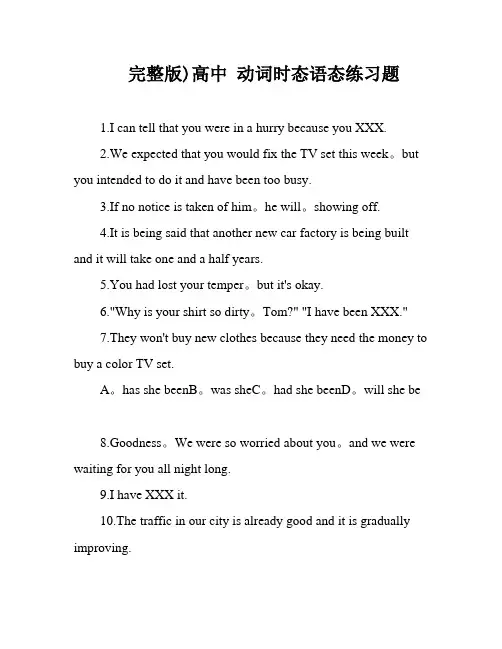
完整版)高中动词时态语态练习题1.I can tell that you were in a hurry because you XXX.2.We expected that you would fix the TV set this week。
but you intended to do it and have been too busy.3.If no notice is taken of him。
he will。
showing off.4.It is being said that another new car factory is being built and it will take one and a half years.5.You had lost your temper。
but it's okay.6."Why is your shirt so dirty。
Tom?" "I have been XXX."7.They won't buy new clothes because they need the money to buy a color TV set.A。
has she beenB。
was sheC。
had she beenD。
will she be8.Goodness。
We were so worried about you。
and we were waiting for you all night long.9.I have XXX it.10.The traffic in our city is already good and it is gradually improving.11."Has Jack finished his homework yet?" "I'm not sure。
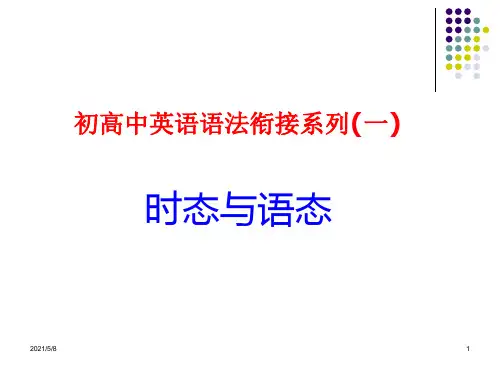
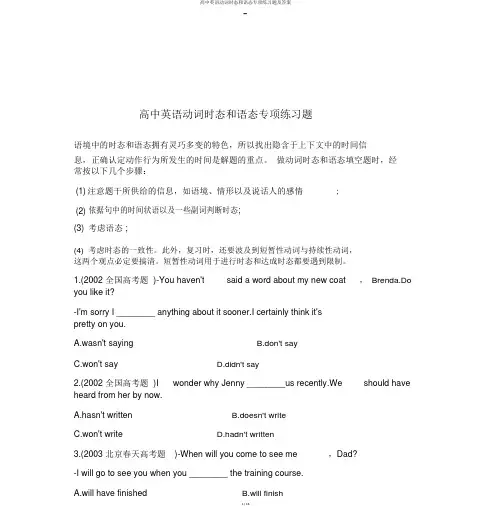
高中英语动词时态和语态专项练习题及答案-高中英语动词时态和语态专项练习题语境中的时态和语态拥有灵巧多变的特色,所以找出隐含于上下文中的时间信息,正确认定动作行为所发生的时间是解题的重点。
做动词时态和语态填空题时,经常按以下几个步骤:(1) 注意题干所供给的信息,如语境、情形以及说话人的感情;(2) 依据句中的时间状语以及一些副词判断时态;(3)考虑语态 ;(4)考虑时态的一致性。
此外,复习时,还要波及到短暂性动词与持续性动词,这两个观点必定要搞清。
短暂性动词用于进行时态和达成时态都要遇到限制。
1.(2002 全国高考题 )-You haven't said a word about my new coat,Brenda.Do you like it?-I'm sorry I ________ anything about it sooner.I certainly think it'spretty on you.A.wasn't sayingB.don't sayC.won't sayD.didn't say2.(2002 全国高考题 )I wonder why Jenny ________us recently.We should have heard from her by now.A.hasn't writtenB.doesn't writeC.won't writeD.hadn't written3.(2003 北京春天高考题)-When will you come to see me,Dad?-I will go to see you when you ________ the training course.A.will have finishedB.will finishC.are finishingD.finish4.(2003 北京春天高考题)-How long ________ at this job?-Since 1990.A.were you employedB.have you been employedC.had you been employedD.will you be employed5.(2003 上海春天高考题)By the end of last year,another new gymnasium________ in Beijing.A.would be completedB.was being completed----C.has been completedD.had been completed6.(2002 北京高考题 )The little girl ________her heart out because she________ her toy bear and believed she wasn't ever going to find it.A.had cried; lostB.cried; had lostC.has cried; has lostD.cries; has lost7.(2002 北京高考题 )-Excuse me ,sir.Would you do me a favor?-Of course.What is it?-I ________ if you could tell me how to fill out this form.A.had wonderedB.was wonderingC.would wonderD.did wonder8.(2002 上海高考题 )He will have learned English for eight years by thetime he ________ from the university next year.A.will graduateB.will have graduatedC.graduatesD.is to graduate9.(2002 上海高考题 )I feel it is your husband who ________for the spoiled child.A.is to blameB.is going to blameC.is to be blameD.should blame10.He has been writing the composition the whole morning and he still________.A.has beenB.doesC.hasD.is11.If city noises ________ from increasing , people ________ shout to beheard even at the dinner table 20 years from now.A.are not kept; will have toB.are not kept; have toC.do not keep; will have toD.do not keep; have to12.The price ________ ,but I doubt whether it will remain so.A.went downB.will go downC.has gone downD.was going down13.-How long ________ each other before they ________ married?-For about a year.----A.have they known; getB.did they know; getC.do they know; are going to getD.had they known; got14.You can't move in right now.The house ________.A.has paintedB.is paintedC.is being paintedD.is painting15.-Hey ,look where you are going!-Oh , I'm terribly sorry.________.A.I'm not noticingB.I wasn't noticingC.I haven't noticedD.I don't notice16.The reporter said that the UFO ________ east to west when he saw it.A.was travelingB.traveledC.had been travelingD.was to travel17.-Is this raincoat yours?-No, mine ________ there behind the door.A.is hangingB.has hangC.hangsD.hang18.I turned around and saw everybody ________ at a man who ________ loudly in a foreign language.A.was staring; was shoutingB.was staring; shoutingC.staring; shoutingD.stared; shouted19.Henry remained silent for a moment.He ________.A.thoughtB.had thoughtC.was thinkingD.was thought20.We would like to go and thank him ourselves ,but we ________ out hisaddress yet,A.haven't foundB.hadn't foundC.didn't findD.don't find21.Shirley ________ a book about China last year but I don't knowwhether she has finished.A.has writtenB.wrote----C.had writtenD.was writing22.-Have you got your test result?-Not yet.The papers ________.A.are not correctingB.have not correctedC.are still being correctedD.have already been corrected23.See the clouds! It ________ rain!A.willB.is going toC.mustD.certainly24.Do I have to take this medicine? It ________ so terrible.A.tastesB.is tastingC.is tastedD.has tasted25.Don't take the magazine away.It ________ me.A.is belonged toB.belongs toC.was belonged toD.is belonging to26.Is this the third time that you ________ late?A.have beenB.amC.wasD.had been27.-Do you know when Tom ________ from abroad?-Perhaps it will be a long time before he ________.A.will come; will comees; will comeC.will come; comeses; comes28.My uncle said that he would telephone but I ________ from him so far.A.didn't hearB.hadn't heardC.haven't heardD.won't hear29.The telephone ________ four times in the last hour ,and each time it________ for my roommate.A.has rung; wasB.has been ringing; isC.had rung; wasD.rang; has been30.A storm ________ by a calm.A.is often being followedB.was often followedC.is often followedD.has often been followed----31.The pen I ________ I ________ is on my desk,right under my nose.A.think; lostB.thought; had lostC.think; had lostD.thought; lost32.-We could have walked to the station.It was so near.-Yes ,a taxi ________ at all necessary.A.wasn'tB.hadn't beenC.couldn't beD.won't be33.A friend of mine returned to his house after a holiday only to findit ________.A.to be brokenB.had broken intoC.was brokenD.had been broken into34.They believed that by using computers the production of their factory ________.A.will greatly increaseB.would greatly increaseD.will have been greatly increased35.His eyes shone brightly when he finally received the magazines he________.A.had long been expectedB.had long expectedC.has long expectedD.was long expected36.-Do you like the new pen?-Yes ,it ________ very well.A.is writtenB.is writingC.writesD.wrote37.-Oh , it's you? I didn't recognize you.-I ________ my hair cut,and I ________ new glass.A.had; was wearingB.have had; am wearingC.had; woreD.have had; wear----38.As she ________ the newspaper , Granny ________ asleep.A.read; was fallingB.was reading; fellC.was reading; was fallingD.read; fell39.However hard you ________,you will never succeed in pleasing her.A.tryB.will tryC.should tryD.would try40.-Can I help you ,sir?-Yes ,I bought this radio yesterday , but it ________.A.didn't workB.won't workC.can't workD.doesn't work41.-How are you today?-Oh , I ________ as ill as I do now for a very long time.A.didn't feelB.wasn't feelingC.don't feelD.haven't felt42.When Jack arrived he learned Mary ________ for about an hour.A.had goneB.had set offC.had leftD.had been away43.By this time tomorrow we ________ the machine.A.have repairedB.shall have repairedC.will repairD.would repair44.I don't think Jim saw me ,he ________ into space.A.just staredB.was just staringC.has just staredD.had just stared45.Helen ________ her key in the office so she had to wait until her husband________ home.A.had left; cameB.has left; comesC.left; had comeD.had left; would come46.-You have left the light on.-Oh , so I have.________ and turn it off.A.I'll goB.I've gone----C.I goD.I'm going47.This is Ted's photo.We miss him a lot.He ________ trying to save a childin earthquake.A.killedB.is killedC.was killedD.was killing48.The notice ________ "No smoking."A.is wroteB.readsC.writesD.is read49.Good care must ________ babies particularly while they are ill.A.takeB.take ofC.be takenD.be taken of50.Shortly after we ________ ,a waiter cameover to our table with a smile.A.seatedB.were seatedC.sat ourselvesD.had seated51.-You look pale , what troubled you?-I ________ my dead friend.A.am thinking aboutB.was thinking aboutC.had thought aboutD.will think about52.John and I ________friends for eight years.We first got to know each other at a Christmas party.But we ________ each other a couple of timesbefore that.A.had been; have seenB.have been; have seenC.have been; had seenD.had been; had seen53.Do make sure that you ________ a seat today!A.gotB.getC.shouldD.have get54.We ________ at the house as we ________ of buying it.A.looked; were thinkingB.were looking; were thinkingC.were looking; thoughtD.looked; had thought----55.-I'm told that you are leaving for Beijing.-Who ________ so?A.saidB.had saidC.saysD.has said56.I ________ the room to be empty but found it occupied.A.had thoughtB.have thoughtC.didn't thinkD.was thinking57.Selecting a mobile phone for personal use is no easy taskbecause technology ________ so rapidly.A.will have changedB.has changedC.is changingD.will change58.I ________ ping-pong quite well ,but I haven't had time to play since the new year.A.will playB.have playedC.playedD.play59.Visitors ________ not to touch the exhibits.A.will requestB.are requestedC.are requestingD.request60.They ________ a snowstorm on their way home.A.caught inB.had caughtC.were caughtD.were caught in参照答案:1~ 5 DADBD6~10 BBCAD11~ 15 ACDCB16~20 AAACA21~ 25 DCBAB26~30 ACCAC31~ 35 BADCC36~40 CBBAD41~ 45 DDBBA46~50 ACBDB51~ 55 BCBBC56~60 ACDBD【分析】1.用过去时表达没能早说之意。
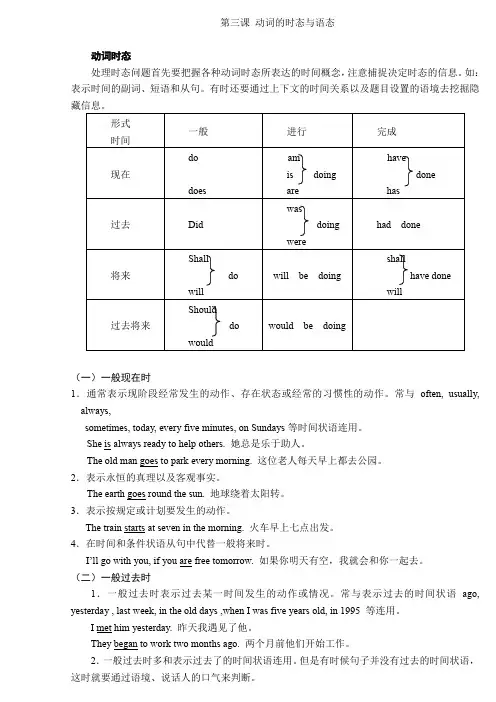
第三课动词的时态与语态动词时态处理时态问题首先要把握各种动词时态所表达的时间概念,注意捕捉决定时态的信息。
如:表示时间的副词、短语和从句。
有时还要通过上下文的时间关系以及题目设置的语境去挖掘隐藏信息。
(一)一般现在时1.通常表示现阶段经常发生的动作、存在状态或经常的习惯性的动作。
常与often, usually, always,sometimes, today, every five minutes, on Sundays等时间状语连用。
She is always ready to help others. 她总是乐于助人。
The old man goes to park every morning. 这位老人每天早上都去公园。
2.表示永恒的真理以及客观事实。
The earth goes round the sun. 地球绕着太阳转。
3.表示按规定或计划要发生的动作。
The train starts at seven in the morning. 火车早上七点出发。
4.在时间和条件状语从句中代替一般将来时。
I’ll go with you, if you are free tomorrow. 如果你明天有空,我就会和你一起去。
(二)一般过去时1.一般过去时表示过去某一时间发生的动作或情况。
常与表示过去的时间状语ago, yesterday , last week, in the old days ,when I was five years old, in 1995 等连用。
I met him yesterday. 昨天我遇见了他。
They began to work two months ago. 两个月前他们开始工作。
2.一般过去时多和表示过去了的时间状语连用。
但是有时候句子并没有过去的时间状语,这时就要通过语境、说话人的口气来判断。
He wrote a novel. 他写了一部小说。
I didn’t expect you were waiting for us. 我没预料到你正在等我们。

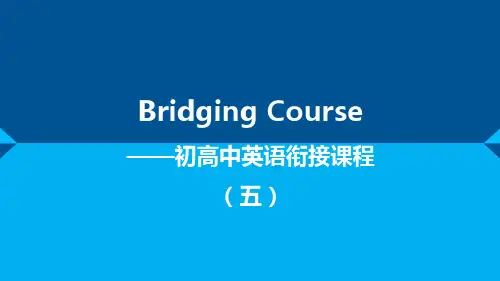
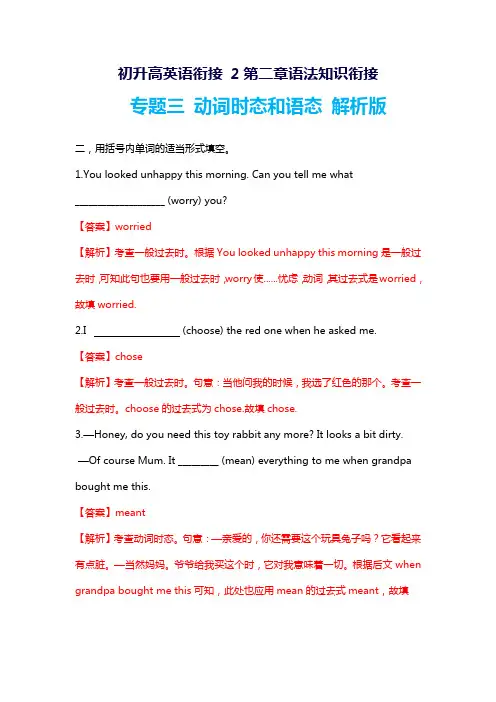
初升高英语衔接2第二章语法知识衔接专题三动词时态和语态解析版二,用括号内单词的适当形式填空。
1.You looked unhappy this morning. Can you tell me what____________________ (worry) you?【答案】worried【解析】考查一般过去时。
根据You looked unhappy this morning是一般过去时,可知此句也要用一般过去时,worry使......忧虑,动词,其过去式是worried,故填worried.【答案】chose【解析】考查一般过去时。
句意:当他问我的时候,我选了红色的那个。
考查一般过去时。
choose的过去式为chose.故填chose.3.—Honey, do you need this toy rabbit any more? It looks a bit dirty. —Of course Mum. It _________ (mean) everything to me when grandpa bought me this.【答案】meant【解析】考查动词时态。
句意:—亲爱的,你还需要这个玩具兔子吗?它看起来有点脏。
—当然妈妈。
爷爷给我买这个时,它对我意味着一切。
根据后文when grandpa bought me this可知,此处也应用mean的过去式meant,故填meant.4.Give me a chance and I ________ (show) it to you.【答案】will show【解析】考查一般将来时。
句意:给我个机会,我将展示给你看。
根据句意,描述即将发生的事情或动作,所以时态是一般将来时,其结构是will+do; show 展示,动词,故填will show.5.Be quiet! The babies ______ (fall) asleep.【答案】have fallen【解析】考查现在完成时和主谓一致。
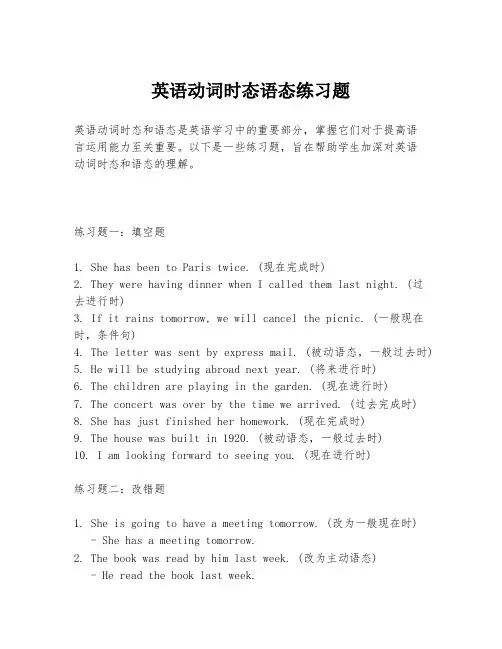
英语动词时态语态练习题英语动词时态和语态是英语学习中的重要部分,掌握它们对于提高语言运用能力至关重要。
以下是一些练习题,旨在帮助学生加深对英语动词时态和语态的理解。
练习题一:填空题1. She has been to Paris twice. (现在完成时)2. They were having dinner when I called them last night. (过去进行时)3. If it rains tomorrow, we will cancel the picnic. (一般现在时,条件句)4. The letter was sent by express mail. (被动语态,一般过去时)5. He will be studying abroad next year. (将来进行时)6. The children are playing in the garden. (现在进行时)7. The concert was over by the time we arrived. (过去完成时)8. She has just finished her homework. (现在完成时)9. The house was built in 1920. (被动语态,一般过去时)10. I am looking forward to seeing you. (现在进行时)练习题二:改错题1. She is going to have a meeting tomorrow. (改为一般现在时)- She has a meeting tomorrow.2. The book was read by him last week. (改为主动语态)- He read the book last week.3. They are working on the project since last month. (改为完成进行时)- They have been working on the project since last month.4. The flowers will be watered by me tomorrow. (改为主动语态) - I will water the flowers tomorrow.5. She was seen to enter the building by the security guard. (改为主动语态)- The security guard saw her enter the building.练习题三:填空题(使用正确的时态和语态)1. I am (be) very happy to hear from you.2. The project was (complete) successfully last month.3. They have been (live) in this city for five years.4. She is (write) a book about her travels.5. The problem will be (solve) by the team soon.6. The house was (build) in the 18th century.7. The children are (play) in the park right now.8. The report has (be) submitted to the manager.9. He will be (study) for his exams next week.10. The cake was (bake) by my mother yesterday.练习题四:翻译题1. 我昨天去了图书馆。
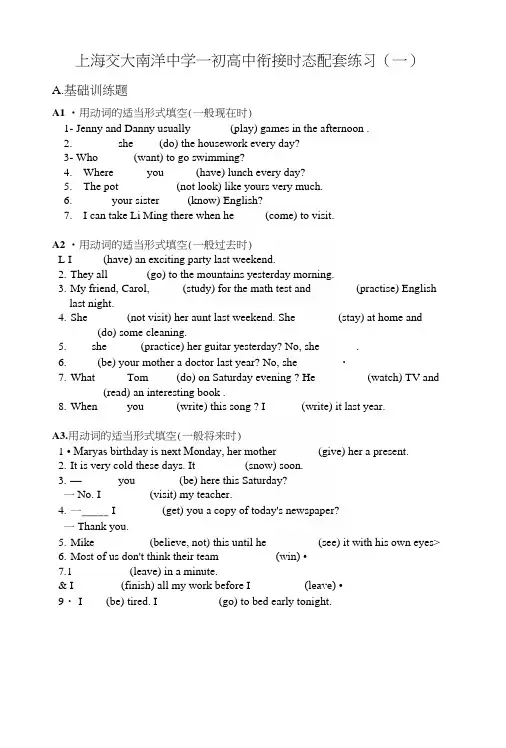
上海交大南洋中学一初高中衔接时态配套练习(一)A.基础训练题A1 •用动词的适当形式填空(一般现在时)1- Jenny and Danny usually ______ (play) games in the afternoon .2. _____ she ____ (do) the housework every day?3- Who _____ (want) to go swimming?4.Where ____ you _____ (have) lunch every day?5.The pot __________ (not look) like yours very much.6. ____ your sister ____ (know) English?7.I can take Li Ming there when he ____ (come) to visit.A2 •用动词的适当形式填空(一般过去时)L I _____ (have) an exciting party last weekend.2.They all _____ (go) to the mountains yesterday morning.3.My friend, Carol, _____ (study) for the math test and _______ (practise) Englishlast night.4.She ______ (not visit) her aunt last weekend. She ______ (stay) at home and____ (do) some cleaning.5. ___ s he _____ (practice) her guitar yesterday? No, she _____ .6. ____ (be) your mother a doctor last year? No, she ______ ・7.What _____ Tom ____ (do) on Saturday evening ? He ________ (watch) TV and ______ (read) an interesting book .8.When ____ you _____ (write) this song ? I ______ (write) it last year.A3.用动词的适当形式填空(一般将来时)1 • Maryas birthday is next Monday, her mother______ (give) her a present.2.It is very cold these days. It _______ (snow) soon.3.— _____ you _______ (be) here this Saturday?一No. I _______ (visit) my teacher.4.一_____ I _______ (get) you a copy of today's newspaper?一Thank you.5.Mike ________ (believe, not) this until he _______ (see) it with his own eyes>6.Most of us don't think their team _________ (win) •7.1 _________ (leave) in a minute.& I_______ (finish) all my work before I ________ (leave) •9・ I ___ (be) tired. I __________ (go) to bed early tonight.B.巩固提高题I.单选11. She said her brother ___ in Beijing. He ______ to Japan on business last week.A. wasn't, wentB. hasrTt, wentC. wasrft, would goD. would be, went 12. 一Did the thieves ____ i nto the car?一No, they _____ •A. fell, didn'tB. fall, didC. jump, didn'tD. jump, did13. Charlie _______ h ere next month.A. isn't workingB. doesn't workingC. isn't going to workingD. won't work 14. 一 ______ you ________ free tomorrow?-No. I _________ f ree the day after tomorrow.A. Are; going to; willB. Are; going to be; willC. Are; going to; will beD. Are; going to be; will be15. Mother _______ m e a nice present on my next birthday.A. will givesB. will giveC. givesD. give16. When _________ L ee ________ s chool this morning?A. had, got to B ・ did, get to C. did, get D. did, got to17. Will you please say it again? I _______ quite _______ you.A. didn^t, hearB. haven^t, heardC. didn^t, heardD. hadrf t, heard18. ____ you ________ at six o,clock yesterday?A. Do. get upB. Did, get upC. Do. got upD. Did, got up 19. 一 Where is the morning paper?一 I ______ it for you at once.1. Jenny ____ i n an office. Her parents ____ in a hospital.A work; worksB works; workC work; are workingD is working; work 2. One of the boys ____ a black ha 匸A haveB there isC there areD has 3. There __________ a meeting tomorrow afternoon.A. will be going toB. will going to beC. is going to be4. We will go shopping if it __ tomorrow.A don't rainB didn't rainC doesn't rainD ・ will go to be D isn't rain 5. He went into the room and ______ the door.A. lockB. lockingC. locksD. locked 6. He said the sun ___ in the east and ___ in the west.A rose; setB rises; setsC rises, setD rise; sets7. 一What ____ you _______ last week?一I bought a bag. A. did .buy B. did 、bought C. do, buy8. Wang Mei ___ music and often ____ to music. A .like; listen B. likes; listens C like; are listening D. do, bought D liking ; listen 9 Jenny ___ E nglish every evening.A .has studyB studiesC studyD studied10. There _____ a telephone call for my brother Steven yesterday.A. isB. areC. wasD. wereA. getB. am gettingC. to getD. will getA. don't know; wereB. hadn't known; areC. haven't known; areD. didn't know; were24. 一When _____ a gain?—When he ______ ,111 let you know.A. he comes; comeB. will he come; will comeC ・ he comes ;will come D. will he come; comes25・The plane is on the point of takingoff.=The plane_______________________________________________ .A. is about to taking offC. is about to take offc.综合拓展题1. 翻译1 •他们每天晩上看电视。
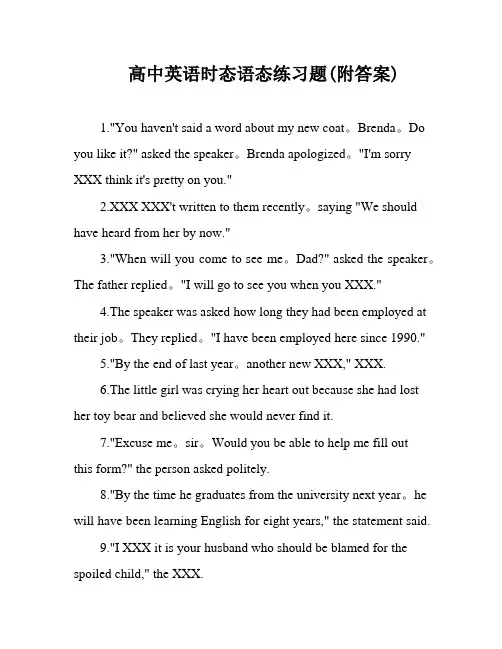
高中英语时态语态练习题(附答案)1."You haven't said a word about my new coat。
Brenda。
Do you like it?" asked the speaker。
Brenda apologized。
"I'm sorry XXX think it's pretty on you."2.XXX XXX't written to them recently。
saying "We should have heard from her by now."3."When will you come to see me。
Dad?" asked the speaker。
The father replied。
"I will go to see you when you XXX."4.The speaker was asked how long they had been employed at their job。
They replied。
"I have been employed here since 1990."5."By the end of last year。
another new XXX," XXX.6.The little girl was crying her heart out because she had lost her toy bear and believed she would never find it.7."Excuse me。
sir。
Would you be able to help me fill outthis form?" the person asked politely.8."By the time he graduates from the university next year。
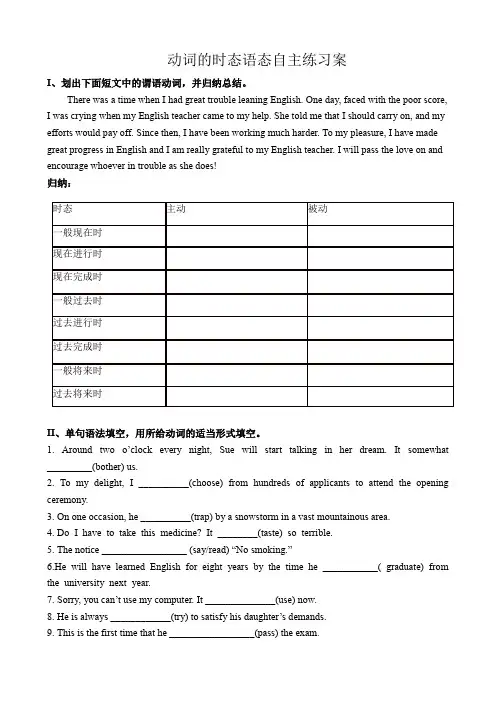
动词的时态语态自主练习案I、划出下面短文中的谓语动词,并归纳总结。
There was a time when I had great trouble leaning English. One day, faced with the poor score, I was crying when my English teacher came to my help. She told me that I should carry on, and my efforts would pay off. Since then, I have been working much harder. To my pleasure, I have made great progress in English and I am really grateful to my English teacher. I will pass the love on and encourage whoever in trouble as she does!归纳:时态主动被动一般现在时现在进行时现在完成时一般过去时过去进行时过去完成时一般将来时过去将来时II、单句语法填空,用所给动词的适当形式填空。
1. Around two o’clock every night, Sue will start talking in her dream. It somewhat _________(bother) us.2. To my delight, I __________(choose) from hundreds of applicants to attend the opening ceremony.3. On one occasion, he __________(trap) by a snowstorm in a vast mountainous area.4. Do I have to take this medicine?It________(taste)so terrible.5. The notice _________________ (say/read) “No smoking.”6.He will have learned English for eight years by the time he___________(graduate)from the university next year.7. Sorry, you can’t use my computer. It ______________(use) now.8. He is always ____________(try) to satisfy his daughter’s demands.9. This is the first time that he _________________(pass) the exam.10. Up to now/ So far, Luxun’s novels ___________________(translate) into many languages and are known all over the world.II、单句语法填空1. bothers2. was chosen3. was trapped4.tastes5.says/reads6. graduates7.is being used8. trying9.has passed 10.have been translated。
表格式一般现在时态和语态一般现在时特点要点内容一般现在时是表示现在经常反复发生的动作存概念标志语谓语动词的时态构成谓语动词语态构成形式温馨提示(重要考点)在的状态或习惯性的动作的时态.often ,sometimes ,always ,usually 等率用,every day, every week, every month, every term, every year, once a week ,twice a year ,on Sundays,1be 的一般在:am isare("是 ")2当是行的候:( 1)当主不是第三人称数的候,一般在用行的原形(2)主是 he,she,it等第三人称数(除去I,you 以外的任何一个数的名或者代),要形加 s 或 es.(温馨提示:动词变形要符合两个条件: 1,主语是三单, 2,句子是肯定句)am / is /are + 去分1表示位置移的 go ,come ,start ,move ,sail ,leave ,arrive ,stay ,live, fly, get 等可用一般在表示按划“即将” 生的作,2 在和条件状从句中,都可用在表示将来(即主将从原,一定要有两个句子)【常主将从的志有if, as soon as( 一⋯就) unless( 如果不when, before, until (直到⋯才 )等从句志】1 .He(play) football very well.2.Jenny(has) a good friend?3.Brian( not live) in China.4.Li Ming with me(be) in Beijing.5.If it( not rain)tomorrow, we will go to the park.6.Our teacher said that the earth(go)around the sun yesterday.7.He(help)the old man every week .8. The old man(help)by him every week.9.The building(visit) by many people every year.一一般现在时(一)定义:主要用来表示人、事物的在状况和特点;表示常或性的作,句子中常有often, always, from time to time等状;表示客律和永恒真理等He usually goes to work at 7 o ’clock every morning.The earth goes around the sun. Guangzhou is situated in the south of China.(二)标志词:always, usually, often, sometimes, hardly ever ,every week (day, year, month ⋯ ),once /twice a week, on Sundays,(三)谓语动词构成:1be 动词的一般现在时:am is are("是",“在”)2当谓语动词是行为动词的时候:( 1)当主语不是第三人称单数的时候,一般现在时用行为动词的原形(2)主语是 he,she,it 等第三人称单数(除去 I,you 以外的任何一个单数的名词或者代词),动词要变形加 s 或 es.(温馨提示:形要符合两个条件:1,主是三,2,句子是肯定句)(四) .基本结构:1,肯定句:主+( +其他的)He loves sports.Jane is an outgoing girl.(主 He 是三,又是肯定句,所以生形,加上了s)Tom and Tim both have medium height.He has a big mouth.We like the dog very much.2,否定句:主+don’t或者doesn’t+原形+其他(在 be 或者后面加上do does) Candy doesn’t do her housework every day.We don’t dance .He isn’t a worker.3,一般疑句:Do (Does)+ 主 +原形 +其他?(把be 或者 do does 提到主的前面)Does she like English? Yes,she does.No,she doesn’t.Do you swim in summer?Are you a teacher?4,特殊疑句:疑+一般疑句Where does Tom come from?(五 )一般现在时态用法(1)经常性或习惯性的作,常与的状用:eg: We always help each other.It often snows in winter. I get up early every morning.(2)表示主在的特征、性格、能力等。
初高中英语衔接之动词的时态与语态 动词时态 时态是表示行为、动作和状态在各种时间条件下的动词形式。英语中有16种时态。常用的时态有:一般现在时、一般过去时、现在完成时、过去完成时、现在进行时、过去进行时、过去将来时、将来进行时、将来完成时。 处理时态问题首先要把握各种动词时态所表达的时间概念,注意捕捉决定时态的信息。如:表示时间的副词、短语和从句。有时还要通过上下文的时间关系以及题目设置的语境去挖掘隐藏信息。
形式 时间 一般 进行 完成
现在 do does am is doing are have done has
过去 did was doing were had done
将来 Shall do will will be doing shall have done will
过去将来 Should do would would be doing
(一)一般现在时 1.通常表示现阶段经常发生的动作、存在状态或经常的习惯性的动作。常与often, usually, always, sometimes, today, every five minutes, on Sundays等时间状语连用。 She is always ready to help others. 她总是乐于助人。 The old man goes to park every morning. 这位老人每天早上都去公园。 2.表示永恒的真理以及客观事实。 The earth goes round the sun. 地球绕着太阳转。 3.表示按规定或计划要发生的动作。 The train starts at seven in the morning. 火车早上七点出发。 4.在时间和条件状语从句中代替一般将来时。 I’ll go with you, if you are free tomorrow. 如果你明天有空,我就会和你一起去。
(二)一般过去时 1.一般过去时表示过去某一时间发生的动作或情况。常与表示过去的时间状语ago, yesterday , last week, in the old days ,when I was five years old, in 1995 等连用。 I met him yesterday. 昨天我遇见了他。 They began to work two months ago. 两个月前他们开始工作。 2.一般过去时多和表示过去了的时间状语连用。但是有时候句子并没有过去的时间状语,这时就要通过语境、说话人的口气来判断。 He wrote a novel. 他写了一部小说。 I didn’t expect you were waiting for us. 我没预料到你正在等我们。 3.used to do sth. 意为“过去常常做某事”,暗含“现在不做了”之意。be used to do sth. 意为“被用于做某事”,不定式表示目的,可用于多种时态。be used to doing sth. 习惯做某事。 He used to get up early . 过去他总是早起。(现在不这样了) He will be used to getting up early . 他将会习惯早起。 Wood is used to make paper. 木材被用来造纸。
(三)一般将来时 1、表示将要发生的动作或存在的状态,常用的时间状语有later(on), soon, in a month, next time, from now on, tomorrow等。 I shall be eighteen years old next year. 明年我就十八岁了。 He will not go to the airport to meet her this afternoon. 今天下午他不去机场接她。 2、一般将来时的其它表示形式 (1)一般现在时表将来 ①按照计划或时刻表要发生的事情。 The new library opens next month. 新图书馆下月开放。 The plane takes off at 3:00 P.m. 飞机于下午三点起飞。 ②在条件状语从句和时间状语从句中用一般现在时表将来。 If you leave tomorrow , I’ll see you at the airport. 如果你明天走,我到机场送你。 When she comes, I’ll tell her about it. 她来时我将把这件事告诉她。 (2)现在进行时表将来 现在进行时表示将来,往往是指计划好或准备要做的事。一些表示动作转换的终止性动词,如go, come, leave, start, begin,stay,take off,arrive等,或者也称为位移性动词,其进行时表示马上要做某事。 I’m taking the kids to the zoo this Sunday. 这个周日我将带孩子们去动物园。 He is leaving school in one year’s time.他一年后就要毕业了。 (3)be to do sth结构表示计划中约定的或按职责、义务和要求必须去做的事或即将发生的动作。 The president is to visit Japan in May.主席将于五月访问日本。 I’m to get married next year. 我明年结婚。 (4)be about to do. 结构表示“刚要做某事,马上要做某事,正要做某事”,强调动作即将发生(不跟表将来的时间状语连用)。 We are about to discuss this problem.我们将马上讨论这个问题。 They were about to leave when the telephone rang. 他们正要离开时电话响了。 3、will和be going to的区别。 (1)will多表示带意愿色彩的将来或客观上将来要发生的事,也可表示临时做出决定将要做的事。 I will stay with you and help you. 我会和你一起并且帮助你。 —You have left the light on. 你还开着灯呢。 — Oh, so I have. I will go and turn it off. 哦,确实是的。我马上去关掉它。 (2)be going to常用于口语中,主要用来表示将发生的动作或存在的状态、打算或准备要做的事或根据某种迹象判断可能将要发生的事。 There’s going to be an English film this evening. 今晚有一场英文电影。 Look at those clouds. It’s going to rain. 看那些乌云,要下雨了。
(四)现在完成时 1、表示过去发生或已经完成的某一动作对现在造成的影响或结果。常与already, ever, never, just ,yet等副词连用。 I have just finished my homework. 我刚刚完成我的家庭作业。 He has been to Germany. 他去过德国。 2、表示从过去某时刻开始,持续到现在的动作或情况,并且有可能会继续持续下去,此时经常用延续性动词。时间状语常用since加一个过去的时间点,或for加一段时间,或加一个现在时间。 I have known him for three years. 我认识他三年了。 He has lived here since 1995.他自1995年以来就住在这儿。 【注意】(1)因为含有for加一段时间或since加一时间点这样的时间状语的完成时,有延续性的特点,所以不能使用瞬间动词。 My sister has been married for 5 years.我姐姐结婚五年了。 My sister has married. Don’t disturb her. 我姐姐已经结婚了。不要打扰她。 (2)在This/That/It is the first/second/third/..time that..句型里,从句要用现在完成时。 This is the second time that the products of our company have been shown in the International Exhibition. 这是我公司产品第二次参加国际展览会。 (3)句型It is/has been...since..所使用的两种时态都正确。 It is/has been 10 years since I last saw him. 从我上次见到他以来已经有10年了。
(五)过去完成时 1、过去完成时是一个相对时态,表示过去的过去,只有在两个过去发生的动作相比较时才可显示出来。 When we got to the station, the train had left. 2、过去完成时表示截止到过去某一时间已经完成的动作。 By the end of last month, we had reviewed four books. 截止到上个月末,我们已经复习了四本书。 3、表示思维的动词用过去完成时,意为“原本······(但事与愿违)”。 I had thought that he would win. 我原以为他能赢。 We had believed that he could tell the truth. 我们原本相信他能够说实话。
(六)现在进行时 1、现在进行时表示说话时或现阶段正在进行的动作。 Listen, someone is crying. 听,有人在哭。 What are you doing these days? 这些天你们在干什么? 2、有时,现在进行时也与always等副词连用,表示反复出现的习惯性动作,用以表达说话人赞扬、讨厌等情绪。 He is always asking the same question. 他总是问同一个问题。(厌烦) 3、动词go, come, leave, arrive, start, begin, end等表将要发生的动作时也用现在进行时。 They are leaving for Shanghai. 他们将动身去上海。 4、状态动词be, have, belong to, remember, know, love, like, prefer, remember, forget, hope, wish, want, see, hear, find, feel等一般不用于进行时。 Do you know where he is? 你知道他在哪儿吗?